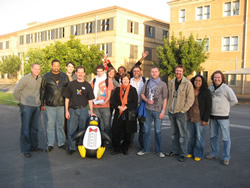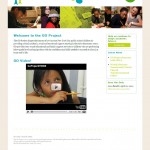|
August 13-19, 2009 - Cape Town, South Africa I'll begin with my trip to Cape Town, South Africa for their Joomla!Day in August. Among the audience at this conference were Joomla! users and people interested in using it, NGOs, local universities and small businesses. The day before the event there was a training day where I had the opportunity to work with 20 individuals from the community (ex. Food Bank of South Africa) to give them hands on instructions and lessons about using Joomla!.
When they came to us asking if we could help create an individual home on the internet for each and every one of these Discovery Shops, we had just one question: When do we start? By leveraging the power of Non-Profit Soapbox and crafting a common template for consistent branding across the network, we built 40 sites to promote each individual shop - all efficiently and easily for not much more than the cost of a single site. No fuss. No muss. Just a high quality network of easy to manage sites to further an important mission. But don't take our word for it. Hear it straight from Steven Wirt, Director of Online and Internal Communications for the American Cancer Society of California: "I’ve been very impressed and pleased with Non-Profit Soapbox. Wrangling 40 web sites has been a seamless, pain-free experience."
Every year on May 1st, CCW and AFT promote recognition of Worthy Wage Day by organizing a variety of activities to recognize and honor the dedication of early childhood educators and staff and to draw attention to their low wages and minimal benefits. This national day of awareness is just one of the many lasting effects of the Worthy Wage Campaign that CCW organized from 1991-1999. In addition to some of the work we do for clients like site redesigns, upgrades, migrations to Non-Profit Soapbox or Joomla and custom applications, we also like finding cool tools for our clients and partners to use in whatever way works best for them. We've written about website, databases, applications, webinars, conferences and more in the past. Today's cool tool is a combination of many resources - Google. Oh, just Google? you might be thinking. Well, duh, we use Google Docs and Gmail and Google Calendar. But hold on, don't click away yet. You might use some of Google's basic features, but have you really looked into what they do for non-profits? Read on a little more and you'll see some of the great resources at your fingertips - all through Google. This is the second post in our series about the PICnet Team's volunteer efforts. Jamie Ozimek contributed to this post. Who: Project Manager Katie Guernsey
At AFTA, Katie serves as a member on the Emerging Leaders Council, and the chair of the Technology and Communications Committee. As a Councilmember, she helps inform the direction that AFTA takes in supporting arts administrators who identify themselves to be "emerging" in their career on a national level. What exactly does that mean? According to Katie, AFTA's definition of an "Emerging Leader" is someone under 35 years old, or in the field less than five years, but depending on the person, these guidelines can change a little. The Emerging Leaders Council devises programming, networking, and professional development opportunities for their peers under the guise of AFTA's infrastructure. On a local level, Katie helps to coordinate professional networking opportunities such as the "Creative Conversations." Some of Katie's specific duties include maintaining AFTA's Google Group and overseeing the strategy of how to best serve their constituency through online technologies. This year, she facilitated one of the Emerging Leader Networking Sessions at the Annual Convention.
But not every child and their family starts a new school year with ease- and that's where The GO Project comes in. Many children in Lower Manhattan public schools are first or second generation Americans with parents who speak little to no English, their families are struggling financially, and they don't have the resources to fully benefit from the public school system. The GO Project has been addressing the intellectual, social and emotional needs of children attending public elementary schools in lower Manhattan and their families since 1968. Their support services and programs help over 300 struggling elementary school children each year build the confidence and skills they need to realize their potential and succeed at school, at home and in life. You've got your website. It's your organization's virtual front door. You work hard to lay out the welcome mat, tend the flower boxes, wash the windows, and offer enough content to get people inside for a heart-to-heart coffee table chat about you and your mission. So you've got curb appeal. You've got substance. But how do you get folks into your neighborhood and knocking on your door in the first place? Great question. Boosting traffic and attracting eyeballs to your site is key to online success. If people aren't coming and viewing your site, it isn't doing its job to move your mission forward. Tracking site traffic: Knowing who's coming to your site The first part of improving is knowing how your site performs now. The easiest and cheapest way for assessing that is a handy tool called Google Analytics. This is free and tracks website traffic. Got some question you want to know about who and how people are visiting your site? How long the average person spends poking around? What search term they typed into Google to come across your little home away from home on the interwebs? How many people living in Burkina Faso visited your site on a Tuesday at 10:23 pm? The Google knows. It knows it all. And it will tell you - provided you've signed up for a free account and had us install the tracking code it provides. No Google Analytics yet? Interested? Check out our Tips and Tricks post about tracking traffic. You can also view an informative Google-created video there giving an overview of Analytics. Jamie Ozimek contributed to this blog post. Today marks the first dedicated National Day of Service and Remembrance, on the 8th anniversary of the 9/11 terrorist attacks on the U.S. We though it fitting to start our PICnet Volunteer Series today. Every few weeks, we'll be featuring another PICnet Team Member and his or her service efforts. To read more President Obama's call for service and the introduction to this series, click here.
When he's not helping to develop websites for PICnet clients, Kevin takes even more hours out of his day (and night) to volunteer with the Joomla project, as a member of their Development Team. Currently, he is on their Joomla Bug Squad as the co-maintainer of the current release series. To break it down for you, Kevin tests for bugs reported by the community, writes patches, and reviews and commits patches added to the releases. He also serves as a member of the Joomla Security Team, for which he tests for security vulnerabilities in new releases of the open-source CMS and adds the appropriate patches. Even the most thoughtfully designed website needs some attention from time to time. Our clients' needs change and develop, and their websites must change with them. And as we know, technology changes, too, sometimes so quickly that the next new version of something is out before you've barely gotten used to the current one. So what happens when a PICnet client needs assistance with their website after it has launched? They contact the PICnet Support Team and we get their issues resolved. At PICnet, we are passionate about supporting our clients. They are more than just accounts to us - they - YOU - are our partners. We care about the issues that our clients stand for, and strive to be an integral part of their success. We have been undergoing a philosophical metamorphosis in the PICnet Support Department over the past couple of months, further articulating what makes us unique, and we are really excited about it! It is a client-forward strategy that we like to call the PICnet Salon Experience. We understand how frustrating technical support can be. We know, because we have to interact with support from dozens of companies ourselves in our daily work. We are constantly frustrated by a lack of responsiveness, unknowledgeable support agents, confusing ticketing systems, and ultimately, unsatisfactory solutions to our problems. PICnet is committed to being the opposite of that. |
 It's about time that I gave another update on some of my travels to spread the word about PICnet, Joomla! and technology. Over the next few weeks you'll see installments from my trips to South Africa, Brazil, Mongolia, New York, and more. The key theme? Engaging with Joomla! communities around the world to share our experiences, lessons learned and latest innovations and vision to create a better product for the user - that may be you!
It's about time that I gave another update on some of my travels to spread the word about PICnet, Joomla! and technology. Over the next few weeks you'll see installments from my trips to South Africa, Brazil, Mongolia, New York, and more. The key theme? Engaging with Joomla! communities around the world to share our experiences, lessons learned and latest innovations and vision to create a better product for the user - that may be you!



